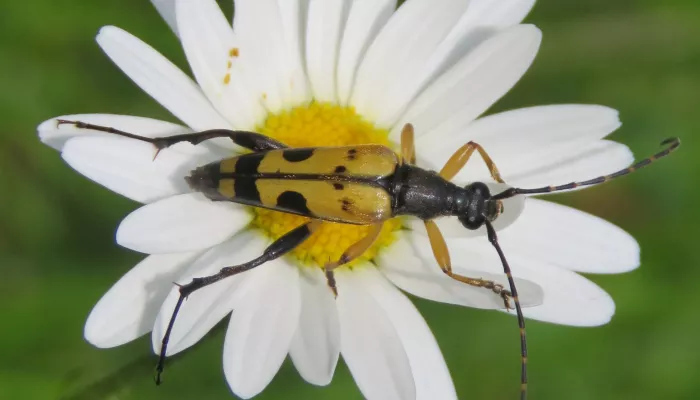Wildlife charities are asking people in Kent to count the number of insects splattered on their number plate to help experts fully understand local insect populations.
Kent Wildlife Trust and Buglife are urging people to sign up to the ‘Bugs Matter’ survey as part of Insect Week, a campaign by the Royal Entomological Society, running between Monday 20th and Sunday 26th June, aimed at encouraging people of all ages to learn about insects.
Participants are asked to download the Bugs Matter app and print a ‘splatometer’ which is taken with them on an essential car journey. Once the trip is completed the citizen surveyor is asked to use the splatometer grid to count the number of bugs that have been squashed on the number plate and report their findings via the Bugs Matter app.
The survey will run until the end of August and it is anticipated that the data collected will help experts discover ways in which insects can be protected from further population losses.
Insects pollenate around three-quarters of our food crops and are a critical component of our ecosystem. Alarmingly previous surveys have found that the number of insects in Kent fell by a staggering 72% between 2004 and 2021. Worryingly these results are consistent with declining trends in insect populations globally.
Director of Conservation at Kent Wildlife Trust, Paul Hadaway said: “We strongly urge everyone to get involved with the Bugs Matter survey as it provides us with important information about our environment. This crucial citizen science information can also be used as a gauge to see where we have been successful in helping nature to recover.
“Knowing how many insects we have allows us to measure the health of our environment and falling numbers is an indication that nature is in trouble. Please download the app, print a splatometer and get involved; together we can change the narrative of the stark future we face.”
Paul Hetheringtion, Director of Communications at Buglife said: “It is critically important that as many people as possible take part in the survey and please remember the short journeys to school or the shops are as important as the long ones as they enable us to understand what is happening on a much more local basis.
“I cannot stress how the more data received improves the accuracy of our conclusions and ability to take steps to arrest the shocking declines highlighted in the 2021 survey.”

